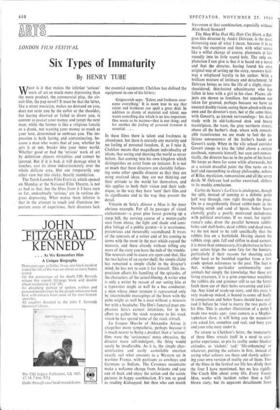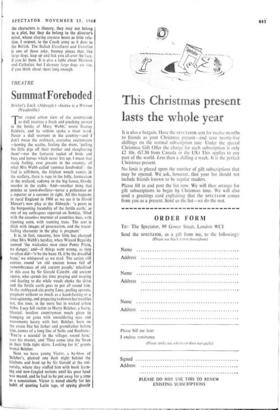Six Types of Immaturity
LONDON FILM FESTIVAL
By HENRY TUBE
WHAT iS it that makes the inferior 'serious' work of art so much more depressing than the mere product, the commercial play, the cir- cuit film, the pap novel? It must be that the latter, like a street musician, makes no demand on you, does not seize you by the collar or the shoulder, but having diverted or failed to divert you, is content to pocket your money and tempt the next man; while the former is like a religious fanatic or a drunk, not wanting your money so much as your love, determined to embrace you. The im- pression is both lasting and contaminating, be- cause a man who wants that of you, whether he gets it or not, breaks into your inner world. Whether good or bad the 'serious' work of art by definition abjures trivialities and cannot be ignored. But if it is bad, it will damage what it touches, cast its slime indiscriminately over the whole delicate area, blot out temporarily any other view but this sticky, beastly inundation.
The Tenth London Film Festival, which opened on Monday at the National Film Theatre, is not as bad as that, but the films from it I have seen so far, undoubtedly 'serious,' are in various de- grees depressing. What makes them inferior is that in the attempt to touch and illuminate im- portant areas of experience, their directors lack the essential equipment. Chekhov has defined the equipment in one of his letters : Grigorovich says: 'Talent and freshness over- come everything.' It is more true to say that talent and freshness can spoil a great deal. In addition to plenty of material and talent, one wants something else which is no less important. One wants to be mature—that is one thing; and for another the feeling of personal freedom is essential. . . .
In these films there is talent and freshness in abundance, but there is scarcely any maturity and no feeling of personal freedom, if, as I take it, Chekhov means that magnificent individuality of idiom, that seeing and showing the world as never before, that coming into his own kingdom which distinguishes an artist from an imitator. It is not so much that these directors are slavishly follow- ing some other specific director as that they are using received ideas, they are not thinking out their attitude to the world for themselves, and this applies to both their vision and their tech- nique, to the way they have 'seen' their film and its significance and to the way they present the detail.
Vittorio de Seta's Almost a Man is the most obvious example. For all its passages of visual enchantment—a great pine forest growing up a steep hill, the curving course of a motor-yacht seen from above, the light and shade and com- plex foliage of a public garden—it is wearisome, pretentious and inexorably secondhand. It treats of the neurosis of a writer and of his coming to terms with the event in the past which caused the neurosis, and there already without telling any more of the story you have the nub of the trouble. The neurosis and its cause are open-and-shut, like the two halves of an oyster-shell; the simple cliché has remained a simple cliché in the director's mind, he has not re-seen it for himself. This im- precision affects his handling of the episodes, of the characters, of the actual filming. A writer who is only a writer by reason of our seeing him at a typewriter might as well be a bus conductor, a man whose inner torment is represented only by interminable massagings of the brow with the palm might as well be a man without a neurosis but with a headache. The film's funereal pace em- phasises Seta's earnest intentions, for in his effort to gather the stock response to his stock vision he has spared none of the stock stimuli.
La Longue Marche of Alexandre Astruc is altogether more sympathetic, perhaps because it is much nearer to being a product than a 'serious' film; were the 'seriousness' more obtrusive, the director more self-indulgent, the thing would surely be insufferable. As it is, the simple char- acterisation and easily assimilable emotion exactly suit what amounts to a Western set in wartime France, with partisans as cowboys and Germans as Indians. The Cevennes mountains make a welcome change from Arizona and you can sit back and enjoy the action and the scenic pictures in happy combination. It's not so good as reading Kidnapped, but then who can match Stevenson at that combination, especially without Alan Breck Stewart?
The Man Who Had His Hair Cut Short, a Bel- gian film directed by Andrd Delvaux, is the most distressing case of what I mean, because it is so nearly the exception and then, with what seems like a wilful change of course, plummets at last roundly into its little round hole. The only ex- planation I can give is that it is based on a novel and that the director, having found his own original way of setting up the story, recovers half- way a misplaced loyalty to his author. With a brilliant mixture of intimacy and detachment, M Delvaux brings us into the life of a slight, slope- shouldered, thin-haired schoolmaster who has fallen in love with a girl in his class. Places, ob- jects are shown as familiars, but somehow not taken for granted, perhaps because we have an unusual double vision, seeing them afresh with our own and the director's eyes, but at the same time, with Govert's, as known surroundings : his dark study with its old-fashioned desk and heavy mantelpiece, the tram, the grey northern streets, above all the barber's shop, where with remark- able transference we are made to feel the de- licious sensuousness of the barber's hands on Govert's scalp. When in the vile school corridor Govert stoops to kiss the label above a certain coathook, romantic himself, but seen anti-roman- tically, the director has us in the palm of his hand. He keeps us there for some while afterwards, but at a certain dreadful point the film turns on its heel and succumbing to cheap philosophy, echoes of Rilke, mysticism, romanticism and all the seven devils M Delvaux had earlier exorcised, slithers to its muddy conclusion.
Carlos de Saura's La Gaza is analogous, though the split, instead of coming at a definite point half way through, runs right through the piece. On to a magnificently filmed rabbit-hunt in the burning scrub and sand of Spain, Sefior Saura clumsily grafts a poorly motivated melodrama with political overtones. if we must, for signifi- cance's sake, draw the parallel between rabbit- holes and shell-holes, dead rabbits and dead men, we do not need to be told specifically that the rabbits live on a battlefield. Having shown the rabbits stop, spin, fall and stiffen in dead earnest, it is more than unnecessary, it is plain crass to have your actors feign the same fate for the hunters, particularly if their reasons for shooting each other have to be fumbled together from a few crude spoken references to the past. The fact is that, without particular sentimentality over animals but simply the knowledge that these are living creatures, it is a grim experience watching the rabbits die and grimmer still to see the ferret fetch them out of their holes screaming and kick- ing. Any kind of made-up story, and this story is very made-up indeed, is bound to come off badly in comparison and Sefior Saura should have real- ised it before he tried to marry the two parts of his film. This is another illustration of a point I made two weeks ago: your camera is a Mephis- tophelean slave, it will bring you the mountain you asked for, complete and real, and bury you and your trite story under it.
To return to Chekhov's letter, the immaturity of these films reveals itself in a need to cate- gorise experience, to pin its reality under blanket attitudes, as `violent,' sad,"life-enhancing' or whatever, putting the colours in first, instead of seeing what colours are there and slowly achiev- ing your own version of reality out of them. Two of the films in the festival see life less direly than the four I have mentioned, but no less rigidly. The Czech film about army life, Every Young Man, works with incident rather than a full- blown story, but its apparent detachment from
the characters is illusory, they may not belong to a plot, but they do belong to the director's mind, whose cloying coyness bears as little rela- tion, I suspect, to the Czech army as it does to the British. The Italian Uccellacci and Uccellini is one of those joky, bouncy pieces that, like large dogs, leap up and lick you all over the face, if you let them. It is also a fable about Marxists and Catholics, but I daresay large dogs are too, if you think about them long enough.















































 Previous page
Previous page